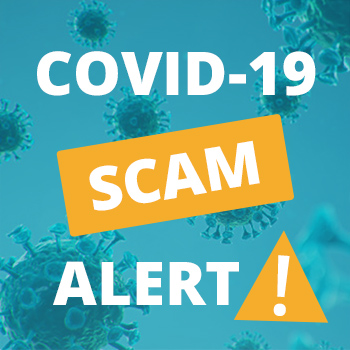SCAMS that are being used during the COVID-19 Crisis:

- Contact tracing text scams. Contact tracing is the important process of tracking down anyone who may have been exposed to the coronavirus, so they can take precautions against spreading it further. State health departments often initiate this process with a text to say that someone will be calling. Scammers have taken note and are sending similar messages, but their texts will ask for money or Social Security numbers, or include a link to a malicious website.
- Test kit scams. While the Food and Drug Administration (FDA) has authorized several in-home test kits for COVID-19, most advertised kits have not been approved (and aren't necessarily accurate). One particular target for this scam is Medicare beneficiaries; crooks are offering tests in exchange for Medicare and other personal information. Be aware that there have also been reports of fake testing sites, complete with tents and workers in hazmat suits.
- Fake fed phishing scams. Phone calls or emails may claim to be from the CDC (your caller ID may even display that name), offering information about the virus in exchange for personal information or a donation tipoff that you're not talking with a federal agency.
- Medical scams. Be wary of calls or emails from doctors or hospitals claiming to have treated a friend or relative for COVID-19 and demanding payment.
- Stimulus scams. Anyone due to receive a stimulus payment is bound to be anxiously awaiting it; some thieves are claiming they can speed up the process or offer new stimulus payments in exchange for a fee or personal information. Or, posing as IRS agents, they may say you were overpaid and have to refund some of the money.
- Charity scams. Taking advantage of peoples goodwill, thieves are pretending to work for coronavirus-related charities (either real or made up) and asking for donations. Before you give any money, make sure its a legitimate charity (check with a watchdog group like Charity Navigator), then call the organization directly or donate through its website.
- Miracle cure scams. There's no vaccine for COVID-19 yet, but that hasn't stopped crooks from pushing fake products that claim to prevent or cure the virus. Air purifiers? Essential oils? Herbal teas? Fake, fake and fake.
- Shopping scams. Nonexistent stores may claim to sell products in high demand, like masks and hand sanitizer. Since theyre just fronts designed to fool consumers, the products never arrive and the website for the company eventually disappears.
- App scams. Preying on fear and curiosity, scammers have created mobile apps they claim are designed to track the spread of COVID-19. While the app may appear legitperhaps even using official datatheres a chance it also includes malware, spyware or ransomware.
FOR A CHECKLIST TO HELP YOU PROTECT THOSE YOU CARE ABOUT FROM FINANCIAL ABUSE, CLICK HERE.
|
|
|